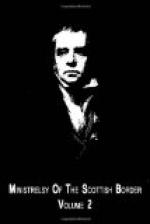A yet more dreadful case was that of Philip Standfield, tried upon the 30th November, 1687, for cursing his father (which, by the Scottish law, is a capital crime, Act 1661, Chap. 20), and for being accessory to his murder. Sir James Standfield, the deceased, was a person of melancholy temperament; so that, when his body was found in a pond near his own house of Newmilns, he was at first generally supposed to have drowned himself. But, the body having been hastily buried, a report arose that he had been strangled by ruffians, instigated by his son Philip, a profligate youth, whom be had disinherited on account of his gross debauchery. Upon this rumour, the Privy Council granted warrant to two surgeons of character, named Crawford and Muirhead, to dig up the body, and to report the state in which they should find it. Philip was present on this occasion, and the evidence of both surgeons bears distinctly, that he stood for some time at a distance from the body of his parent; but, being called upon to assist in stretching out the corpse, he put his hand to the head, when the mouth and nostrils instantly gushed with blood. This circumstance, with the evident symptoms of terror and remorse, exhibited by young Standfield, seem to have had considerable weight with the jury, and are thus stated in the indictment: “That his (the deceased’s) nearest relations being required to lift the corpse into the coffin, after it had been inspected, upon the said Philip Standfield touching of it (according to God’s usual mode of discovering murder), it bled afresh upon the said Philip; and that thereupon he let the body fall, and fled from it in the greatest consternation, crying, Lord have mercy upon me!” The prisoner was found guilty of being accessory to the murder of his father, although there was little more than strong presumptions against him. It is true, he was at the same time separately convicted of the distinct crimes of having cursed his father, and drank damnation to the monarchy and hierarchy. His sentence, which was to have his tongue cut out, and hand struck off, previous to his being hanged, was executed with the utmost rigour. He denied the murder with his last breath. “It is,” says a contemporary judge, “a dark case of divination, to be remitted to the great day, whether he was guilty or innocent. Only it is certain he was a bad youth, and may serve as a beacon to all profligate persons.”—FOUNTAINHALL’S Decisions, Vol. I. p. 483.
While all ranks believed alike the existence of these prodigies, the vulgar were contented to refer them to the immediate interference of the Deity, or, as they termed it, God’s revenge against murder. But those, who, while they had overleaped the bounds of superstition, were still entangled in the mazes of mystic philosophy, amongst whom we must reckon many of the medical practitioners, endeavoured to explain the phenomenon, by referring to the secret power of sympathy, which even Bacon did not venture to dispute. To this occult agency was imputed the cure of wounds, effected by applying salves and powders, not to the wound itself, but to the sword or dagger, by which it had been inflicted; a course of treatment, which, wonderful as it may at first seem, was certainly frequently attended with signal success.[A] This, however, was attributed to magic, and those, who submitted to such a mode of cure, were refused spiritual assistance.




